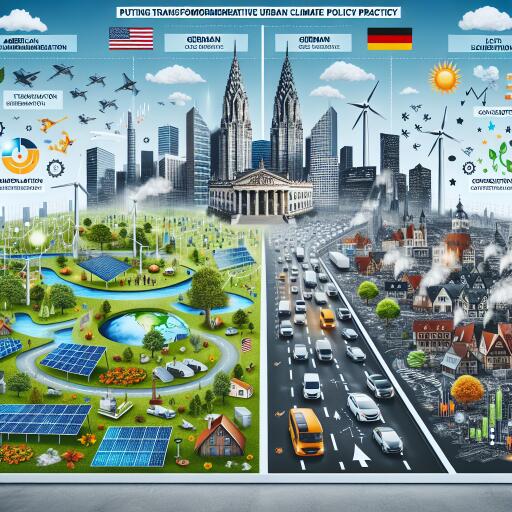
Actors Driving Transformative Urban Climate Action
In the evaluation of climate action in urban settings, transformative approaches have emerged as crucial themes. Within various cities, notably Long Beach, Mannheim, Karlsruhe, and Oakland, discourse surrounding climate initiatives is prominently shaped by city administrations, who, despite financial constraints, along with elected officials and grassroots movements push these narratives forward. While the industrial sector’s participation is limited, exceptions like the Karlsruhe Institute of Technology play pivotal roles in merging science with public climate dialogues. Notably, community organizations in Oakland have been instrumental in ensuring social justice remains central to climate policies.
Common Themes in Climate Action Discourse
Across cities, recurring themes in climate policy include recognition of climate change impacts, the necessity of local-level action, energy transitions from fossil fuels, and a reassessment of mobility patterns. There’s a push for climate considerations to take precedence over economic growth. However, peculiar contextual differences arise; for instance, German cities frequently discuss greening urban landscapes, while Californian counterparts focus more on environmental justice and accountability.
Impact of Social Movements and Events
Movements like Fridays For Future (FFF) and Black Lives Matter have significantly influenced climate policy discourses. For instance, protests in German cities have catalyzed discussions, whereas social justice movements have dominated discourse in Californian cities. Additionally, specific events such as the closure of coal-fired power plants in Mannheim have become focal points of public debate and media coverage.
Challenges and Disagreements in Policy Implementation
Balancing climate action with economic interests remains contentious. Stakeholders often grapple with the tension between economic sustainability and environmental goals. Urban leaders express concerns about potential negative impacts of rapid energy transitions on local economies and job markets. While environmental and civil society groups advocate for prioritizing climate action over economic constraints, there’s a continual push for aligning sustainability with economic interests.
Transformative Urban Climate Change Solutions
Long Beach exemplifies transformative change by transitioning away from fossil fuels, despite potential economic repercussions. Oakland emphasizes equity-driven policies, ensuring vulnerable communities benefit from and contribute to climate solutions, as reflected in their ‘Equitable Climate Action Plan.’ This plan aims to transition towards a sustainable, inclusive economy, emphasizing community empowerment.
Integrating Health and Scientific Knowledge
Oakland has linked climate action with public health objectives by curtailing coal transport through vulnerable areas; albeit the legal setbacks, this shows a commitment to healthier urban environments. Meanwhile, cities like Mannheim are investing in green infrastructure to improve urban living quality. Karlsruhe stands out for integrating scientific insights into policy creation, ensuring data-driven climate strategies.
Barriers to Transformative Climate Action
Despite progressive narratives, certain discursive modalities impede change. Reactive approaches, focusing on short-term adaptations, often preserve the status quo rather than instituting systemic change. Additionally, the entrepreneurial drive, while showing potential for innovation, tends to emphasize commercial benefits over equitable, transformative climate solutions. Further, instances of maladaptation, where well-intended policies inadvertently exacerbate climate risks, have been flagged in cities like Long Beach.
Emerging Hindrances and Path Forward
Climate paralysis, characterized by a desire to act but indecisiveness on action pathways, is evident in Californian cities. This stalls policy creation and implementation, as stakeholders become overwhelmed by the complexities and interconnectedness of climate responses. However, the increased advocacy for integrated, science-backed, and socially inclusive approaches reflects a shift towards genuinely transformative urban climate policies.





Leave a Reply